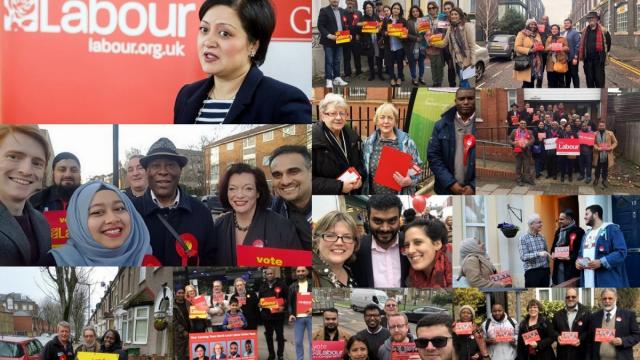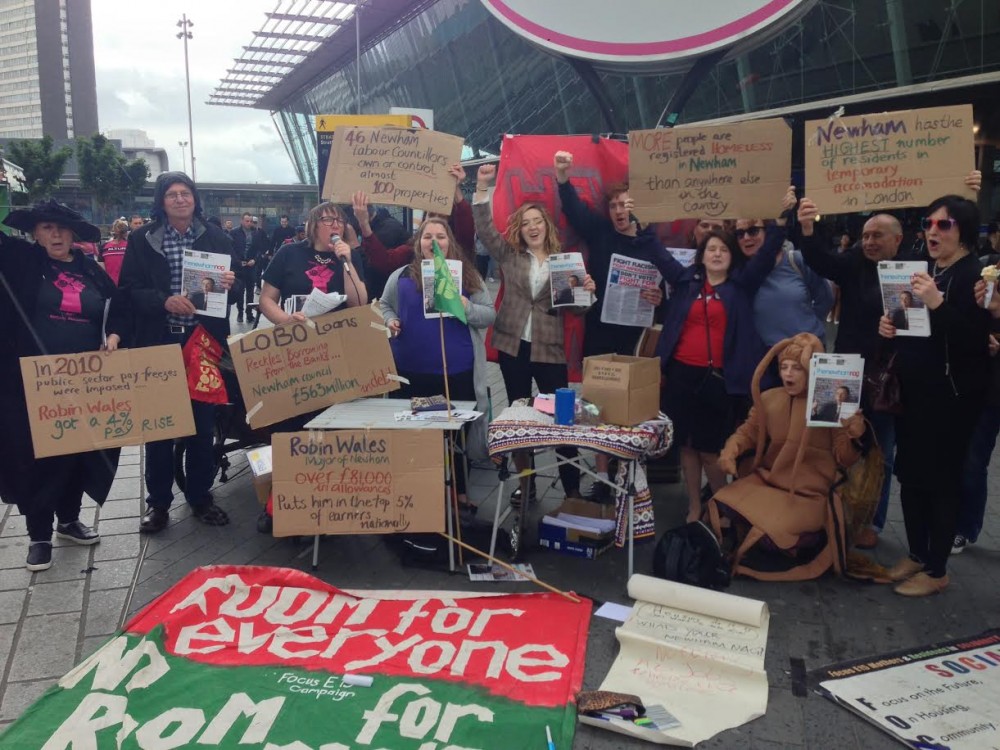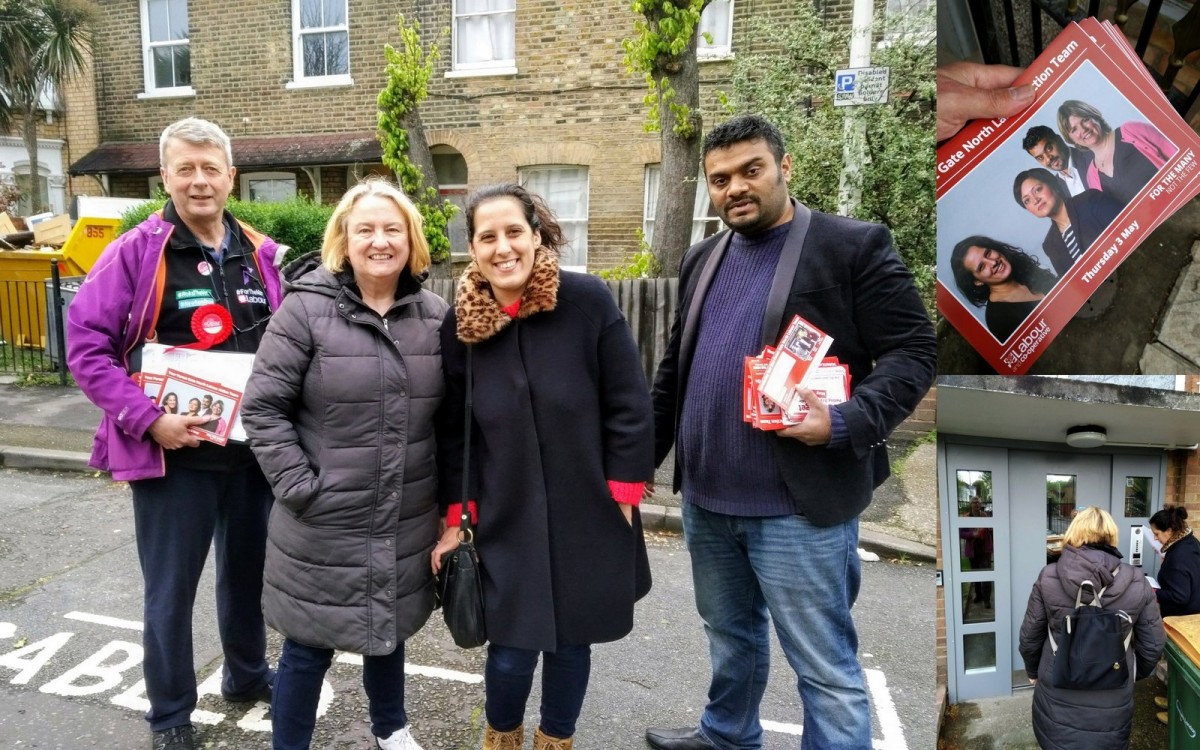
This is Part 11 in a series about Radical Municipalism looking at ways people worldwide are organizing in their cities to build power from the bottom up. Read Part 1 (Brazil) Part 2 (Rojava), Part 3 (Chiapas), Part 4 (Warsaw), Part 5 (Bologna), Part 6 (Jackson), Part 7 (Athens) and Part 8 (Warsaw & New York), Part 9 (Reykjavík), and Part 10 (Argentina).
In May 2018 local elections, the U.K.'s longest-standing directly elected mayor was ousted. It happened in Newham, East London, where Rokhsana Fiaz took power with a radical manifesto to alleviate the council's housing crisis and increase citizen participation.
The election of Fiaz, the first woman of color to become a mayor in Europe, has parallels with Alexandria Ocasio-Cortez's recent victory in New York City.
For one, Fiaz is in the opposite corner of the Labour Party from the neoliberal Robin Wales, whom she replaced, and is already challenging big finance. Both Ocasio-Cortez and Fiaz are part of a new generation surging in the Labour and Democratic parties on both sides of the Atlantic.
As a result, not only is the face of each of their parties changing, but a debate about whether their parties should, and can, put people above profits is intensifying.
For instance, Newham's decision to take on Barclays bank shows the council is addressing what has become a full-blown crisis in U.K. local government. Fiaz may not call herself a radical municipalist, but her actions demonstrate a new way of doing politics.
Notably, Newham's sea change opens up questions about how parties of the left can escape their generation-long love affair with neoliberalism, and the role local politics can play in this transformation.
How One London Borough is Challenging Big Finance
Fiaz announced in July that Newham is suing Barclays, a bank that sold them LOBO (Lender Option, Borrower Option) loans. The problems with LOBO loans are well-documented. In a 2015 Parliamentary inquiry, a former Barclays trader said he "would not do these deals if you put a gun to my head."
LOBOs are complex financial instruments that can carry interest rates of up to 10%, and can last up to 70 years, as Occupy.com previously reported. Debt Resistance UK found that 240 councils across Britain are losing millions to banks in excess interest payments on LOBOs despite the fact that those councils could equally borrow from the central government.
This research has been developed into the form of a Citizen Debt Audit in Newham by Research for Action, a workers co-operative. In a recent report that I contributed to, entitled "Cuts and Contempt: Experiences of Austerity and Council Democracy in Newham," the authors detail residents' experience of lack of services while interest payments grow.
Newham is one of 15 councils nationwide that are now taking class action against Barclays on LOBOs. Previously, Newham Councillor Fiaz had called on the council to listen to resident concerns regarding LOBOs. The response was to attack the messenger, not deal with the message. Now, that's starting to change.
The case highlights how little Robin Wales's administration listened to residents in one of Britain's most diverse and deprived boroughs – and how this negligence ultimately led to a movement within the party that challenged his leadership. Wales also faced resistance from social movements, including the housing rights movement like Focus-E15, whose single mothers took to the streets nationwide to press their case.
Rethinking Local Politics in Newham
Mayor Fiaz has sought to rectify another dubious financial decision, initiating a public investigation that found the Newham council had wasted £40 million on a loan for Newham's former Olympic stadium.
At the first council meeting since becoming mayor, Newham council held a Peoples Assembly with the aim to establish "openness, resident engagement, transparency and accountability." These are antonyms for the previous administration.
In concrete terms, Newham now plans to deal with homelessness, including establishing a new 20-bed homeless refuge and offering more support for those sleeping rough.
The council will also build 1,000 new homes for social housing. The mayor will even put her position to a referendum as to whether to abolish the concentrated power of her position.
Municipalism and Reclaiming U.K. Labour and U.S. Democrats
The new era of activist government in Newham is far from isolated. After a grassroots campaign to prevent bulldozing a nearby community, another Labour-dominated London borough, Haringey, has deselected its mayor.
Elsewhere, similar changes are happening in local Labour councils, from Brighton on the southeast coast to Liverpool in England's opposite corner.
A similar wave of leftist U.S. Democrats is one the rise, spurred particularly to fight Donald Trump's policies. Examples include Dylan Parker, who was elected to the city council in Rock Island, Illinois, and #BlackLivesMater activist khalid kamau in South Fulton, Georgia.
In Pennsylvania, Elizabeth Fiedler, Sara Innamorato and Summer Lee are among those standing for state positions in November. Julia Salaza is running in the primaries for New York's state legislature.
Nationally, both the Democratic and Labour parties personnel are changing in a similar direction. For instance, Cori Bush of Missouri and Brent Welder of Kansas were hoping to join Ocasio-Cortez in the U.S. Congress. In the UK, where the Labour Party is led by leftist Jeremy Corbyn, there is a movement to deselect neoliberal MPs – including strong calls to replace four parliamentarians who consistently prop up the Conservatives' shaky grip on power.
In mainstream discourse, British Labour's leftist leadership is attacked for being unelectable, even though it tops opinion polls. In the U.S., the neoliberal establishment, which still hold sway, pushes a similar argument. Places like Missouri and Kansas could falsify this assertion in November.
Reading between the lines there is an equally important question: In power, could Corbyn's Labour or a Democratic Socialist of America party transform the political direction? Could they, for example, challenge the big banks?
Democratic Socialists Should be Municipalists, Not Use Them
Returning to Newham, the new administration is doing just that. It is backed by a substantive argument that the banks are taking money that could go into public services. But its foundations lay in the social movements and people power, which challenged the old regime and enabled the new mayor to replace the former. Fiaz is not just a representative: There is a movement to continue as allies support her, and they can also hold her feet to the fire if she fails to follow through.
If we look to Greece's Syriza party and Obama's first run at the U.S. presidency, both pledged to take on the power of big finance. Yet Syriza quickly capitulated to the austerity agenda, and Obama never effectively restrained Wall Street. Both Syriza and Obama began with mass engagement, but once in office their participative engagement withered. It is the municipalists now in Greece who are challenging the austerity agenda being pushed by Syriza.
Radical municipalism is people power. It is about rallying people to engage in politics, all the time, not solely to win elections. Radical municipalism as a political way of thinking offers a means to occupy and transform political parties, but only if it is genuinely applied – not merely as lip-service to win elections.
Read: Part 1 (Brazil) Part 2 (Rojava), Part 3 (Chiapas), Part 4 (Warsaw), Part 5 (Bologna), Part 6 (Jackson), Part 7 (Athens) and Part 8 (Warsaw & New York), Part 9 (Reykjavík), and Part 10 (Argentina)














